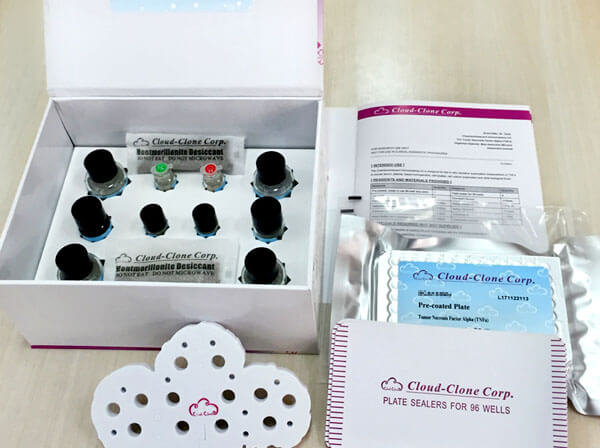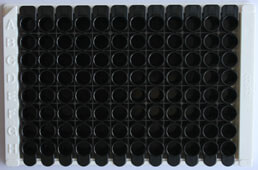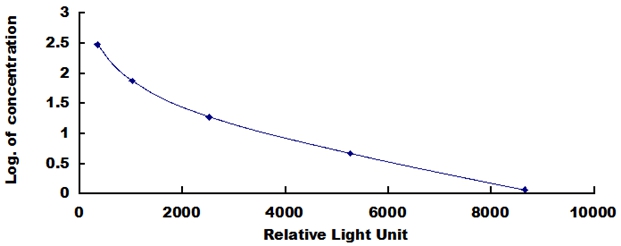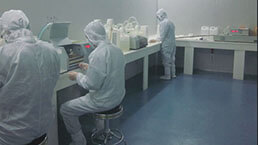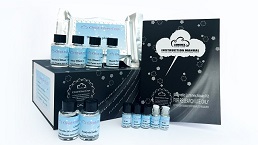CLIA Kit for Hemoglobin (HB) 

Hgb; Haemoglobin; Heterotetramer(αβ)2
- UOM
- FOB US$ 588.00 US$ 840.00 US$ 3,780.00 US$ 7,140.00 US$ 58,800.00
- Quantity
Overview
Properties
- Product No.CCB409Hu
- Organism SpeciesHomo sapiens (Human) Same name, Different species.
- ApplicationsChemiluminescent immunoassay for Antigen Detection.
Research use only - DownloadInstruction Manual
- CategoryMetabolic pathwayInfection immunityHematologyNeuro science
Sign into your account
Share a new citation as an author
Upload your experimental result
Review

Contact us
Please fill in the blank.
Recovery
Matrices listed below were spiked with certain level of recombinant Hemoglobin (HB) and the recovery rates were calculated by comparing the measured value to the expected amount of Hemoglobin (HB) in samples.
| Matrix | Recovery range (%) | Average(%) |
| serum(n=5) | 88-102 | 98 |
| EDTA plasma(n=5) | 85-99 | 94 |
| heparin plasma(n=5) | 80-101 | 90 |
Precision
Intra-assay Precision (Precision within an assay): 3 samples with low, middle and high level Hemoglobin (HB) were tested 20 times on one plate, respectively.
Inter-assay Precision (Precision between assays): 3 samples with low, middle and high level Hemoglobin (HB) were tested on 3 different plates, 8 replicates in each plate.
CV(%) = SD/meanX100
Intra-Assay: CV<10%
Inter-Assay: CV<12%
Linearity
The linearity of the kit was assayed by testing samples spiked with appropriate concentration of Hemoglobin (HB) and their serial dilutions. The results were demonstrated by the percentage of calculated concentration to the expected.
| Sample | 1:2 | 1:4 | 1:8 | 1:16 |
| serum(n=5) | 94-105% | 96-105% | 78-89% | 87-101% |
| EDTA plasma(n=5) | 78-96% | 82-96% | 80-101% | 83-103% |
| heparin plasma(n=5) | 97-105% | 85-94% | 97-104% | 97-104% |
Stability
The stability of kit is determined by the loss rate of activity. The loss rate of this kit is less than 5% within the expiration date under appropriate storage condition.
To minimize extra influence on the performance, operation procedures and lab conditions, especially room temperature, air humidity, incubator temperature should be strictly controlled. It is also strongly suggested that the whole assay is performed by the same operator from the beginning to the end.
Reagents and materials provided
| Reagents | Quantity | Reagents | Quantity |
| Pre-coated, ready to use 96-well strip plate | 1 | Plate sealer for 96 wells | 4 |
| Standard | 2 | Standard Diluent | 1×20mL |
| Detection Reagent A | 1×120µL | Assay Diluent A | 1×12mL |
| Detection Reagent B | 1×120µL | Assay Diluent B | 1×12mL |
| Substrate A | 1×10mL | Substrate B | 1×2mL |
| Wash Buffer (30 × concentrate) | 1×20mL | Instruction manual | 1 |
Assay procedure summary
1. Prepare all reagents, samples and standards;
2. Add 50µL standard or sample to each well.
And then add 50µL prepared Detection Reagent A immediately.
Shake and mix. Incubate 1 hour at 37°C;
3. Aspirate and wash 3 times;
4. Add 100µL prepared Detection Reagent B. Incubate 30 minutes at 37°C;
5. Aspirate and wash 5 times;
6. Add 100µL Substrate Solution. Incubate 10 minutes at 37°C;
7. Read RLU value immediately.

Test principle
The microplate provided in this kit has been pre-coated with a monoclonal antibody specific to Hemoglobin (HB). A competitive inhibition reaction is launched between biotin labeled Hemoglobin (HB) and unlabeled Hemoglobin (HB) (Standards or samples) with the pre-coated antibody specific to Hemoglobin (HB). After incubation the unbound conjugate is washed off. Next, avidin conjugated to Horseradish Peroxidase (HRP) is added to each microplate well and incubated. The amount of bound HRP conjugate is reverse proportional to the concentration of Hemoglobin (HB) in the sample. Then the mixture of substrate A and B is added to generate glow light emission kinetics. Upon plate development, the intensity of the emitted light is reverse proportional to the Hemoglobin (HB) level in the sample or standard.
Giveaways
Increment services
Citations
- Effects of ectoine on behavioural, physiological and biochemical parameters of Daphnia magnaPubmed:25460046
- Comparative Proteomics Identifies Host Immune System Proteins Affected by Infection with Mycobacterium bovisPubmed:27027307
- The intracellular bacterium Anaplasma phagocytophilum selectively manipulates the levels of vertebrate host proteins in the tick vector Ixodes scapularis.pubmed:27561965
- Elevated levels of protein AMBP in cerebrospinal fluid of women with preeclampsia compared to normotensive pregnant women.pubmed:27615121
- Chicory inulin ameliorates type 2 diabetes mellitus and suppresses JNK and MAPK pathways in vivo and in vitropubmed:28105758
- Oxidized Hemoglobin Is Antigenic and Immunogenic in Lupuspubmed:28694810
- 新規人工酸素運搬体HemoAct を用いた脳虚血再灌流障害治療開発に関する研究:
- Mural cell-derived laminin-α5 plays a detrimental role in ischemic strokePubmed: 30777135
- Decylubiquinone suppresses breast cancer growth and metastasis by inhibiting angiogenesis via the ROS/p53/BAI1 signaling pathwayPubmed: 32020421
- Water-extractable zinc protoporphyrin IX in Parma ham predominantly exists as complexes with hemoglobin and myoglobin
- Effects of Human Serum Albumin on the Fluorescence Intensity and Tumor Imaging Properties of IR‐780 Dye34687567




